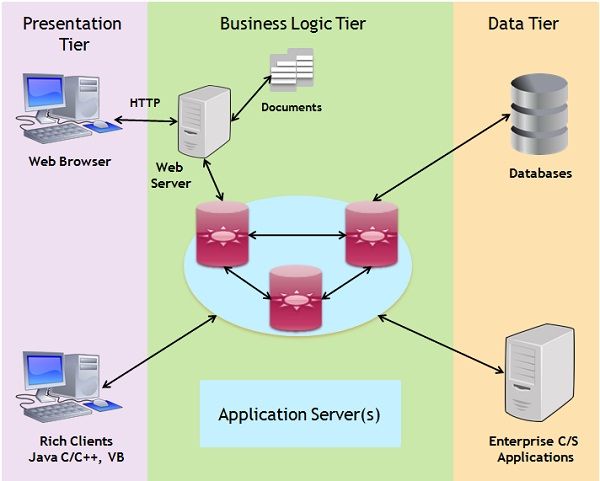 A server is a central repository where data and computer programs are stored and accessed by the clients in the network. Web server and Application server are types of the server where former is used to deliver web pages, and the latter deals with application operations performed between users and back-end business applications of the organization.
A server is a central repository where data and computer programs are stored and accessed by the clients in the network. Web server and Application server are types of the server where former is used to deliver web pages, and the latter deals with application operations performed between users and back-end business applications of the organization.
A Web Server is a program that accepts requests for information and sends the required documents. An application server could be a program or a computer running a program in a distributed network.
Content: Web server and Application server
Comparison Chart
| Basis for comparison | Web server | Application server |
|---|---|---|
| Basic | Web servers are suitable for static content. | Application servers are suitable for dynamic content. |
| Features | Involve only web or servlet container and cannot be used for EJB. | Could contain a web server as an aggregate part of them and also contain web and EJB containers. |
| Assists scripting languages through plugins such as Perl, PHP, ASP, JSP etc. | Assists application level services such as object pooling, connection pooling, transaction support, messaging services etc. | |
| Multithreading | Not supported | Supports multithreading |
| Uses | HTML and HTTP | Graphical user interface, HTTP, RPC/RMI. |
| Resource Utilization | Low | High |
| Provides environment to run | Web application | Enterprise application |
Definition of Web server
A web server is a program which delivers web contents like web pages using Hyper Text Transfer Protocol (HTTP) over the World Wide Web (WWW). It could also be interpreted as a virtual machine that is a program. The primary objective of a web server is to deliver web pages to clients such delivery consists of HTML documents or additional content such as style sheets and javascript.
A web browser present at the client side usually initiates communication by sending a request for the specific web content using HTTP request. Then the web server sends the response along with content. In case of error occurrence, the server sends the error message. A web server can also receive contents from the client side, for example uploading files.
Definition of Application server
An application server is software framework devoted to the effective execution of programs, scripts, and routines to assist the creation of various applications. It serves both types of applications, web-based applications and enterprise based applications. An application server may contain web servers, that is the reason it is considered more superior than a web server.
It is a group of elements which are accessible to the software developer through an API defined by the platform itself in web applications. These elements are often on the same machine as the web server as its main task is to support the construction of dynamic pages. It not only targets generation of web pages, but it also employs services like clustering failover and load balancing which facilitates developers to invest all the focus on implementing business logic.
Key Differences Between Web server and Application server
- Web servers are desirable for static content whereas application servers are appropriate for the dynamic content.
- Web servers support scripting languages like Perl, PHP, ASP, JSP, etc. As against, application server assists scripting languages as well as application level services such as connection pooling, transaction support, object pooling, messaging services etc.
- Application server contains web and EJB containers and a web server as an incorporated part of them. In contrast, a web server only contains web or servlet container and can employ EJB.
- Web server does not support multithreading whereas application server assists multithreading and distributed transaction.
- Web server uses HTML and HTTP protocol. On the other hand, the application server could use graphical user interface and protocols like RPC/RMI including HTTP.
- Load Limit or capacity is higher in case of the application server as compared to the web server.
- The web server provides an environment to run a web application and features like caching and scalability. On the contrary, the application server provides an environment to run web with enterprise applications.
Conclusion
Web servers are primarily designed to serve HTTP content whereas Application server can also suffice HTTP content but is not restricted to just HTTP and assists protocol such as RMI/RPC. An application server can contain web server in it, which means it can perform operations performed by a web server as well as it has additional elements and features to assist connection pooling, object pooling, transaction support, messaging services, etcetera.
nani nina says
thanks for brief explanations